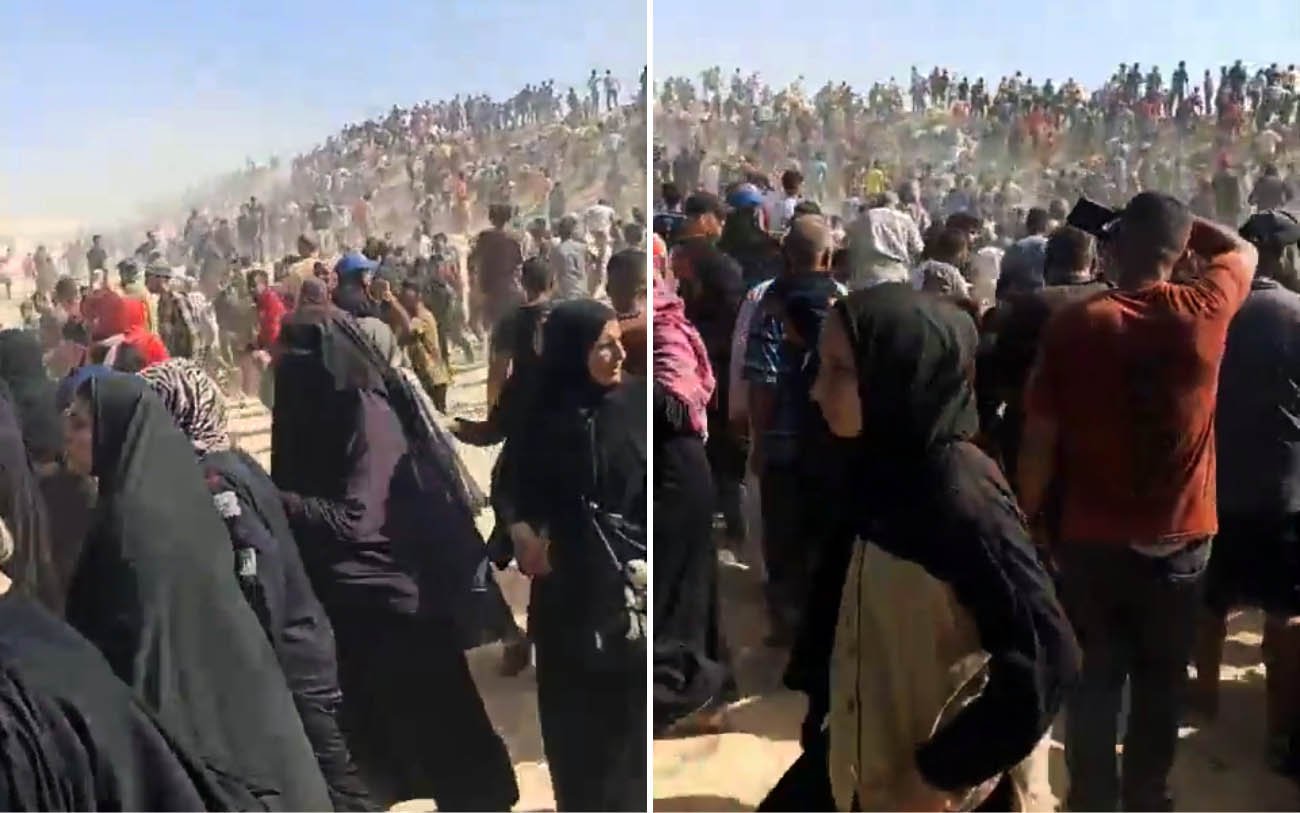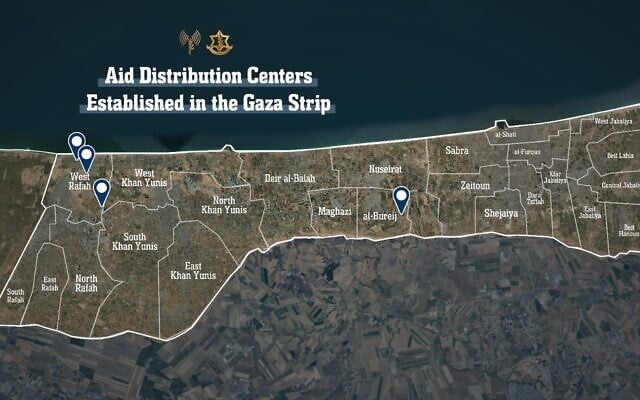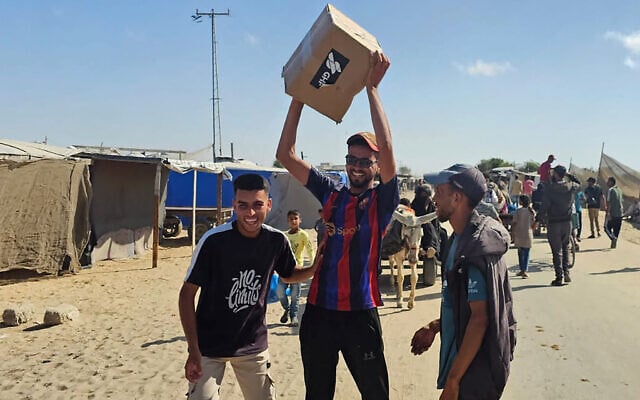



Thousands of Palestinians on Tuesday overran one of the newly established aid distribution sites in southern Gaza’s Rafah, only hours after the military announced the new aid mechanism, backed by Israel and the United States, began operating for the first time.
Footage posted to social media showed crowds surging into the area and taking boxes of food.
The IDF, which secures the area around the facility, confirmed that troops fired warning shots outside the compound, but denied reports claiming it opened fire from a helicopter or towards the center itself.
A military source said an Israeli Air Force helicopter was operating over the sea at the time of the incident, but not anywhere close to the distribution site.
“Control over the situation was established, food distribution operations are expected to continue as planned, and the safety of IDF troops was not compromised,” the military added.
According to Palestinian reports, the American security personnel charged with securing the area fled the scene. There were no reports of casualties in the incident.
The newly created Israel-backed Gaza Humanitarian Foundation sought to downplay the incident, saying that its American security subcontractors fell back in order to allow “a small number” of people to take food.
“The needs on the ground are great. At one moment in the late afternoon, the volume of people at the SDS was such that the GHF team fell back to allow a small number of Gazans to take aid safely and dissipate,” GHF said in a statement.
Before the break-in, GHF said that “approximately 8,000 food boxes have been distributed so far. Each box feeds 5.5 people for 3.5 days, totaling 462,000 meals.”
GHF claimed its operations have returned to normal.
The military announced earlier that two out of four of the recently established sites began operating for the first time, initially delivering food packages to thousands of Palestinian families.
However, an Israeli security official also tried to downplay the incident, telling the Ynet site that none of the aid had been looted.
The newly opened aid centers are operated by the GHF, an American organization that is backed by Israel, designed to bypass the UN and traditional aid agencies in a bid to keep the supplies away from Hamas.
The UN and other international organizations withheld much-needed backing of the GHF, arguing that its aid initiative violates humanitarian principles by requiring Gazans to walk long distances in order to receive aid and limiting distribution to southern Gaza, a move that would forcibly displace the Palestinian population.
Three of the distribution sites are located in the Tel Sultan area of southern Gaza’s Rafah, while the fourth is in the Netzarim Corridor area, south of Gaza City. The two sites that began operations on Tuesday are in Rafah.
“The establishment of the distribution centers took place over the last few months, facilitated by the Israeli political echelon and in coordination with the US government,” the IDF said in its first official comment on the aid sites.
“This process coincided with an ongoing dialogue and cooperation with the IDF, through the Southern Command and COGAT, as well as international aid organizations, the Gaza Humanitarian Foundation, and the American civilian security company,” it said.
The IDF said it will “continue to facilitate humanitarian assistance in the Gaza Strip, while making every possible effort to ensure that the aid does not reach the hands of the Hamas terrorist organization.”
An image posted on X showed that the aid boxes include bags of rice and dried beans, as well as flour, oil, salt, and canned vegetables, many of them in Israeli packaging.
Even before the chaos on Tuesday, Palestinians voiced wariness over the new program.
“As much as I want to go because I am hungry and my children are hungry, I am afraid,” said Abu Ahmed, 55, a father of seven. “I am so scared because they said the company belongs to Israel and is a mercenary, and also because the resistance [Hamas] said not to go,” he said in a message on the chat app WhatsApp.
Hamas, which has in recent months faced protests by many Palestinians who want the devastating war to end, has warned residents against accessing GHF sites, saying Israel was using the company to collect intelligence information.
“Do not go to Rafah… Do not fall into the trap… Do not risk your lives. Your homes are your fortress. Staying in your neighborhoods is survival, and awareness is your protection,” a statement published by the Hamas-linked Home Front said.
“These schemes will be broken by the steadfastness of a people who do not know defeat,” it added.
“Before the war, my fridge used to be full of meat, chicken, dairy, soft drinks, everything, and now I am begging for a loaf of bread,” Abu Ahmed told Reuters via a chat app.
As the mechanism began operations, Jens Laerke, a spokesperson for the UN humanitarian office (OCHA), said the GHF was a distraction from what is needed, such as the opening of crossing points.
Additionally, Juliette Touma, communications director of the UN Palestinian refugee agency, said the UN does not know what is being distributed.
“We don’t have any information,” she said. “We know what’s needed, we know what’s missing, and we are very, very far from that daily target.”
“The needs are 500-600 trucks at a minimum that should go into Gaza, loaded with supplies. Not only food but also medicine, medical supplies, vaccines for children, fuel, water, and other basics for people’s survival,” Touma said. “We have over 3,000 trucks, not only of food, but also medicines that are lining up in places like Jordan, like Egypt, that are waiting for the green light to go in, and they’re carrying medicines, and that is expiring soon.”
While technically an American company, GHF was established earlier this year in close coordination with Israeli authorities, who felt existing aid distribution mechanisms led by the UN and other international organizations were insufficient in preventing the diversion of aid by Hamas.
Israel wanted to create a small number of distribution sites where pre-selected familial representatives would be able to pick up a heavy box full of food for their families in a zone secured and operated by American private contractors.
Earlier Tuesday morning, police said they cleared Israeli protesters who blocked the exit from the Ashdod port in a bid to prevent trucks from carrying humanitarian aid to Gaza.
Two activists were arrested for disturbing public order and refusing to comply with police orders to clear the road, police said.
According to reports, the two are Ruth Ben Haim, the head of the Tzav 9 activist group, which has led efforts to block aid from entering Gaza, and a relative of murdered hostage Maya Goren.
Video from the scene showed chaos as police attempted to clear both protesters and activists from the Standing Together group, which apparently arrived on the scene to protect the shipments.
“Police returned order to the area and are continuing to assist the IDF in securing aid shipments,” police said in a statement.
Under surging pressure from allies, Israel began allowing a trickle of humanitarian aid into Gaza last week after blocking all food, medicine, fuel, or other goods from entering since March 2. Aid groups have warned of famine and say the aid that has come in is nowhere near enough to meet mounting needs.
Gaza’s Hamas-run Health Ministry said Monday that at least 3,822 people had been killed in the territory since the latest ceasefire collapsed on March 18, taking the war’s overall toll to 53,977 — a figure that cannot be verified and does not differentiate between civilians and fighters.
The war broke out on October 7, 2023, when Hamas-led terrorists invaded Israel, killing some 1,200 people, mostly civilians, and kidnapping 251. Terror groups in the Gaza Strip are still holding 58 hostages, including 57 of the 251 abducted on October 7.


